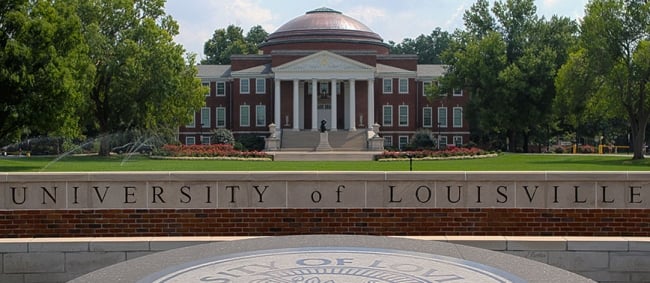You have /5 articles left.
Sign up for a free account or log in.

Contract guarantees for University of Louisville vice presidents are drawing scrutiny.
University of Louisville
The University of Louisville’s complicated leadership situation keeps getting more complex.
The institution’s Board of Trustees is up in the air after a judge last week temporarily blocked Kentucky Governor Matt Bevin’s June appointment of a new board. Embattled President James Ramsey has resigned but indicated he plans to stay on at the University of Louisville Foundation, where he is also president. And Ramsey has left the university with a strong financial incentive to keep on two of his top administrators for years after his departure.
One of those top administrators is Vice President for Strategy and General Counsel Leslie Chambers Strohm. The other is Harlan Sands, the senior vice president for finance and administration. Each has a contract that guarantees their full salary through the end of a five-year term if they are terminated without cause within two years of Ramsey leaving as Louisville president, according to reporting by the Kentucky Center for Investigative Reporting. The pay would be in exchange for consulting services.
Strohm’s contract, signed by Ramsey, is dated February 2015 and provides for a base salary of $350,000 per year. Sands’s contract, also signed by Ramsey, is dated September 2014 and also lays out a base salary of $350,000. That means they could essentially remain locked on Louisville’s payroll until the end of the decade.
Experts panned the contract provisions as both uncommon and restrictive to any president hired to take over for Ramsey permanently. They effectively place a future president in the difficult position of taking a financial penalty for hiring their own trusted deputies -- or keeping administrators they did not hire.
“It’s a terrible policy to lock people like that in place for the next president, because he or she wants their own people for those positions,” said Raymond D. Cotton, a Washington-based lawyer who handles contract negotiations, representing both boards and presidents. “It’s extremely unusual, an arrangement of that magnitude. That length is very unusual in the nonprofit world anywhere, not just higher ed.”
Outgoing presidents can recommend that their replacements keep on top administrators, Cotton said. Sometimes, new presidents keep those administrators in their positions. But Cotton believes the new president needs to be the one making that choice, rather than having it imposed from existing contracts.
“The problem with that is the incoming president is responsible for the budget and the administration of the entire university,” Cotton said. “He or she should have the absolute right to replace anybody who he or she thinks is not up to their standard. While the outgoing president may think these are the best folks, the incoming president has the right to a different opinion.”
Vice presidents are often covered by severance agreements, however. Those agreements are typically spelled out in letters of appointment, and they lay out severance terms that would take effect if an administrator is let go without cause in a certain period of time, according to Karen Goldstein, an independent consultant with George K. Baum & Co., who is a former executive search consultant and former vice president for finance at several institutions.
Severance provisions can be necessary if candidates for top cabinet positions want security in case the president who is hiring them moves to another institution or retires.
“Certainly as I was doing search consulting, that was always a question for the candidates: How long was the president going to be there?” Goldstein said. “If it seemed like the president was going to be retiring, then the candidate would want to have some sort of promise.”
Even against that backdrop, it’s notable that a contract covers Louisville’s senior vice president for finance and administration. The chief financial officer tends to be the last person a new president replaces, Goldstein said. Presidents who are getting their feet on the ground often try to lean on the institutional knowledge of an experienced financial administrator.
“The CFO knows what’s going on,” Goldstein said. “The CFO knows where all the money is, all the agreements are.”
Severance terms for top administrators have typically called for payment of six months to a year’s salary, Goldstein said. So the length of the Louisville guarantees stands out to experts.
“It’s reasonable to give them some guarantees for the future,” said Ronald Ehrenberg, the director of Cornell University’s Higher Education Research Institute. “It’s reasonable to say we’re going to guarantee some salary for some period of years after a transition. It’s probably not reasonable to say we’re going to guarantee you a salary for lots of years.”
The Louisville situation raises a number of questions for future university leaders, Ehrenberg said. Does a new president wait two years before replacing two top positions? Does he or she move power away from those administrators and shift their responsibilities to new hires with different titles -- risking accusations that the move violates the old guard’s contracts?
The amount of money Louisville would have to pay to remove the administrators is relatively small compared to its operating budget, listed at $1.2 billion last year. It’s also relatively small compared to 4.5 percent state funding cuts for universities called for in Kentucky’s most recent budget. Bevin, the governor, also ordered additional cuts that were then challenged in court.
Yet a president new to the job risks blowback for large financial commitments made in order to turn over top administrators.
“Symbolically, it’s a very difficult thing for the president to do,” Ehrenberg said. “Any money that is paid to these people is money that could have been used for the general welfare.”
The situation could dissuade candidates from applying to be Louisville’s president, some observers said. Candidates will likely look carefully at the situation, said Derek Wilkinson, global leader of the public sector and international development practice groups at the executive search firm Boyden. The firm has recruited for presidential, vice presidential and dean positions in higher ed.
“It’s the kind of thing that a prospective candidate would really look hard at and ask a lot of questions about and could ultimately dissuade interest,” Wilkinson said. “It creates entanglements.”
Long-term contracts for positions below the president level are rare but not unheard of, Wilkinson said. He expects them to come under increasing scrutiny where they exist.
“I think you’re going to see a lot of presidents and boards not taking those kinds of things into consideration for secondary roles,” Wilkinson said.
Louisville’s Board of Trustees did approve the contracts, said a university spokesman, John Karman. Ramsey is not granting interviews, and Strohm and Sands are not commenting on their contracts, he said.
The Kentucky Center for Investigative Reporting quoted the chairman of Louisville’s newly appointed Board of Trustees, Ulysses Bridgeman, as saying he was sure the university would uphold its end of legally binding contracts. The center also quoted a trustee from Louisville's old board, Bob Hughes, who said the institution’s next president would be able to weigh the issue of paying out contracts and hiring new leaders.
“I think that would be a real good healing process, too, between the administration [and the board] to work together on that issue,” Hughes said, according to the center.
Louisville Provost Neville Pinto was selected to lead the university while it searches for a new president. But Ramsey's resignation and the new Board of Trustees' standing was thrown into question at the end of July when a state judge issued a temporary injunction that blocked the governor's ability to dismiss the university's old board, on which Hughes had served, and appoint a new one, led by Bridgeman. Ramsey had submitted his resignation to the newly constituted board.
In the end, Louisville will likely be able to draw a pool of applicants for president. The university has had its share of troubles lately, but it also posted noticeable growth under Ramsey. Several issues will have to be resolved before a presidential search, including which board is in control, however.
“There are more people with ambition to be presidents than there are presidencies,” Ehrenberg said. “If the issue of who the board is, if that’s determined, and if a new president can build up a good understanding with the board and they will understand why the first two years are going to be hard for him or her, then it may turn out to be a very attractive job.”
Ehrenberg also wondered how the power dynamics will play out given that Ramsey has indicated plans to stay on at Louisville’s foundation.
“How is that going to work?” Ehrenberg said. “The foundation provides resources from giving and endowments that the university needs, and the person directing it may now have different views than the president.”








